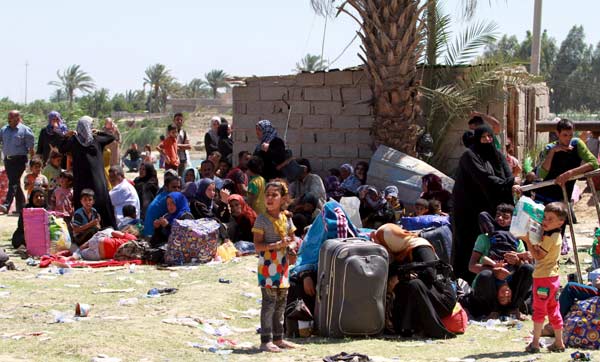500 killed as Ramadi falls to IS
|
Displaced Sunni people from the city of Ramadi arrive at the out-skirts of Baghdad on Sunday. Reuters |
Extremists gaining ground as bodies litter streets, soldiers flee city
A spokesman for the governor of Iraq's Anbar province said on Monday that about 500 people - both civilians and Iraqi soldiers - are estimated to have been killed over the past few days as the city of Ramadi fell to the Islamic State group.
The estimates follow a shocking defeat as Islamic State seized control of the Anbar provincial capital on Sunday, sending Iraqi forces fleeing in a major loss despite the support of US-led airstrikes targeting the extremists.
Bodies, some burned, littered the streets as local officials reported the militants carried out mass killings of Iraqi security forces and civilians. Online video showed Humvees, trucks and other equipment speeding out of Ramadi, with soldiers gripping onto their sides.
"We do not have an accurate count yet," said the spokesman, Muhannad Haimour. "We estimate that 500 people have been killed, both civilians and military, and approximately 8,000 have fled the city."
The estimates are for the past three days, since Friday, when the battle for the city reached its final stages. The 8,000 figure is in addition to the enormous exodus in April, Haimour said, when the UN said as many as 114,000 residents fled from Ramadi and surrounding villages at the height of the violence.
Iran's defense minister arrived in Baghdad on Monday for talks with his counterpart.
Hossein Dehghan "will hold consultations with Iraqi Defence Minister Khaled al-Obeidi", a ministry official said on condition of anonymity, adding that the visit was pre-scheduled.
Local officials have said that IS carried out mass killings of Iraqi security forces and civilians.
With defeat looming, Prime Minister Haider al-Abadi had ordered security forces not to abandon their posts across Anbar province, apparently fearing the extremists could capture the entire desert region that saw intense fighting after the 2003 US-led invasion to topple dictator Saddam Hussein.
Earlier Sunday, al-Abadi ordered Shiite militias to prepare to go into the Sunni-dominated province, ignoring US concerns their presence could spark sectarian bloodshed. By late Sunday, a large number of Shiite militiamen had arrived at a military base near Ramadi, apparently to participate in a possible counteroffensive, said the head of the Anbar provincial council, Sabah Karhout.
AP - AFP



















